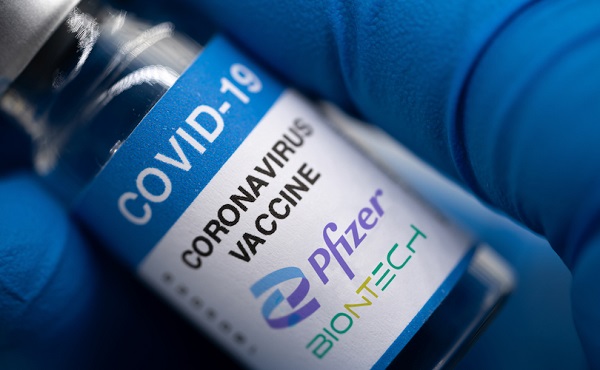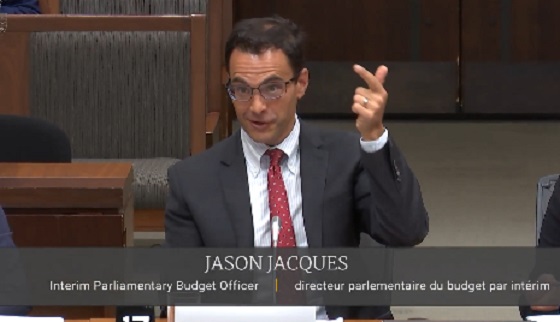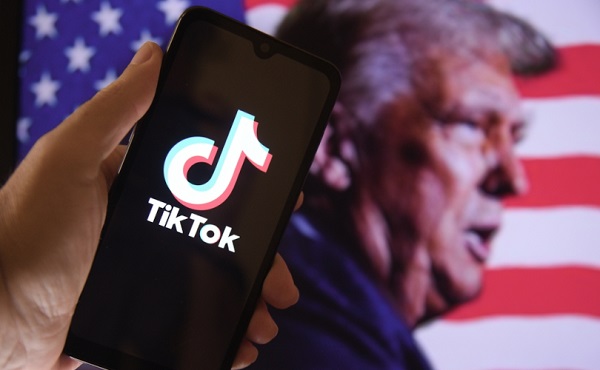COVID-19
Trudeau’s former justice minister resigns from Parliament days after Emergencies Act ruling

Former Minister of Justice David Lametti
From LifeSiteNews
David Lametti worked to enforce the Emergencies Act to shut down the 2022 Freedom Convoy protest that flooded Ottawa during the peak of COVID-related mandates.
Prime Minister Justin Trudeau’s former justice minister David Lametti has announced he is leaving politics just two days after a court ruled that the Trudeau government was “not justified” in invoking the Emergency Act (EA) against the 2022 Freedom Convoy.
On January 25, Liberal Member of Parliament (MP) and former justice minister David Lametti announced his resignation from Parliament to join a law firm just days after Federal Court Justice Richard Mosley ruled that the enactment of the EA to end the 2022 Freedom Convoy violated Charter rights.
“The last six months have been very difficult,” Lametti told Radio-Canada.
“It is therefore with a certain sadness that I leave a dream position,” Lametti wrote in a letter to his constituents. “I have continued to do my best to fulfill my duties as an MP. It’s been a difficult time on a personal level.”
Lametti was justice minister since 2019 and worked to enforce the EA which was enacted to shut down the 2022 Freedom Convoy protest that flooded Ottawa during the peak of COVID-related mandates. The popular protest featured tens of thousands of Canadians calling for an end to the mandates by camping outside Parliament Hill.
Measures taken under the EA included freezing the bank accounts of Canadians who donated to the protest, an action now deemed unjustified by the court.
During his time in office Lametti helped pass several bills, including pushing for increased euthanasia under Canada’s Medical Assistance in Dying (MAiD) program and banning so-called “conversion therapy” for gender-confused individuals.
Trudeau had removed Lametti from his position as justice minister during a massive cabinet shakeup in July of 2023. During this turnover, Trudeau removed seven people, including some un-popular COVID-era ministers, from their posts.
Following this, Lametti continued to serve as MP for LaSalle, Émard, Verdun regions in Quebec. He will officially resign from his position on January 31.
Conservative Party leader Pierre Poilievre responded to Lemetti’s resignation, saying, “Trudeau’s former Justice Minister RESIGNS. He leaves behind him a record of Charter violations, censoring free speech, illegal use of the Emergencies Act & crime policies that have unleashed waves of violence.”
BREAKING: Trudeau’s former Justice Minister RESIGNS
He leaves behind him a record of Charter violations, censoring free speech, illegal use of the Emergencies Act & crime policies that have unleashed waves of violence.
More proof Trudeau is not worth the cost and crime.
— Pierre Poilievre (@PierrePoilievre) January 25, 2024
“More proof Trudeau is not worth the cost and crime,” he concluded.
Lametti’s resignation is not the first piece of drama to flow from the Liberal Party since the Emergencies Act ruling.
Earlier this week, Liberal Member of Parliament (MP) Ken McDonald seemed to call for a review of Trudeau’s leadership, before quickly backtracking the next day.
COVID-19
Second Massive Population Study Finds COVID-19 “Vaccines” Increase Risk of 6 Major Cancers

South Korea study of 8.4 million adults finds higher risks of overall, lung, prostate, thyroid, gastric, colorectal, and breast cancers — across both mRNA and viral-vector platforms.
About a month ago, the first-ever population cohort study reported increased cancer risks following COVID-19 vaccination. In Italy, nearly 300,000 residents were tracked for 30 months, showing that mRNA shots significantly increased the risk of overall cancer, breast cancer, bladder cancer, and colorectal cancer.
|
Now, a second—and far larger—population-based cohort study by Kim et al from South Korea has corroborated and expanded upon those findings. Drawing on a massive sample of more than 8.4 million people, this is one of the most powerful cancer-safety datasets ever analyzed.
The results are striking. After accounting for age, sex, comorbidities, income level, and prior COVID-19 infection, COVID-19 vaccination was linked to significant increases in multiple major cancers, with the signal consistent across all vaccine platforms, both sexes, and age groups:
Study Design at a Glance
- Design & data: Population-based retrospective cohort using the Korean National Health Insurance database (2021–2023).
- Population: 8,407,849 adults.
- Exposure: COVID-19 vaccination (analyzed overall and by platform: mRNA, cDNA, and heterologous schedules).
- Matching: Large-scale propensity score matching (1:4 vaccinated:unvaccinated for the main analysis; 1:2 within vaccinated for booster vs non-booster).
- Modeling: Multivariable Cox proportional hazards models (adjusted for age, sex, comorbidity index, income level, and prior COVID-19 infection), estimating hazard ratios (HRs) with 95% confidence intervals (CIs); analyses stratified by sex and age.
- Outcome window: 1-year incidence of overall and site-specific cancers post-vaccination.
Key Results — Cancers with Significant Increases (1-year follow-up)
- Overall cancer: HR 1.27 (95% CI, 1.21–1.33) → 27% higher risk of all cancers combined in vaccinated vs. unvaccinated at 1 year.
- Lung cancer: HR 1.53 (95% CI, 1.25–1.87) → 53% higher risk
- Prostate cancer: HR 1.69 (1.35–2.11) → 69% higher risk
- Thyroid cancer: HR 1.35 (1.21–1.51) → 35% higher risk
- Gastric (stomach) cancer: HR 1.34 (1.13–1.58) → 34% higher risk
- Colorectal cancer: HR 1.28 (1.12–1.47) → 28% higher risk
- Breast cancer: HR 1.20 (1.07–1.34) → 20% higher risk
Interpretation: An HR of 1.53 for lung cancer means that vaccinated individuals developed lung cancer at a rate 53% higher than matched unvaccinated peers, over the same one-year follow-up period. Similar interpretations apply to each cancer type.
By Vaccine Platform
- cDNA vaccines (AstraZeneca type): linked to higher risks of thyroid, gastric, colorectal, lung, and prostate cancers.
- Overall cancer HR 1.47 (95% CI 1.39–1.56) → 47% higher risk
- mRNA vaccines (Pfizer/Moderna): linked to higher risks of thyroid, colorectal, lung, and breast cancers.
- Overall cancer HR 1.20 (95% CI 1.14–1.26) → 20% higher risk
- Heterologous (mixed schedules): linked to higher risks of thyroid and breast cancers.
- Overall cancer HR 1.34 (95% CI 1.21–1.48) → 34% higher risk
Interpretation: The elevated cancer risks were not confined to one vaccine platform. Whether adenoviral-vector (cDNA), mRNA, or mixed schedules, each vaccine type was associated with a measurable increase in overall cancer — and each had specific cancer sites driving the signal. In other words, no vaccine technology was free of cancer risk in this dataset.
Booster-Dose Analysis
- Gastric cancer: HR 1.23 (p = 0.041) → 23% higher risk with boosters
- Pancreatic cancer: HR 2.25 (p < 0.001) → 125% higher risk with boosters
Interpretation: Booster doses were associated with notably higher risks of gastric and pancreatic cancers. For pancreatic cancer, the risk more than doubled in boosted individuals.
Overall Cancer Trends/Sex & Age Stratification
- Overall cancer: Incidence was higher in the vaccinated across every demographic group.
- Women showed the highest relative burden, with 48.4 per 10,000 vaccinated vs. 38.2 per 10,000 unvaccinated at one year.
- Elderly adults (≥75 years) carried the greatest absolute burden, at 119.9 per 10,000 vaccinated vs. 91.7 per 10,000 unvaccinated.
- Younger adults (<65 years) also experienced a clear overall increase, despite lower baseline rates.
- Site-specific patterns:
- Men: elevated risks for gastric and lung cancers
- Women: elevated risks for thyroid and colorectal cancers
- Under 65 years: stronger signals for thyroid and breast cancers
- ≥75 years: markedly higher risk of prostate cancer
Interpretation: Both the overall and site-specific results show a consistent pattern — every demographic group experienced elevated cancer risks, though the type and absolute burden varied. Women and the elderly were hit hardest, but no population segment was spared.
Taken together, the evidence is now impossible to ignore. The only two population-level cohort studies ever conducted on COVID-19 vaccination and cancer — one in Italy and one in South Korea — have both found major increases in cancer risk. The Italian study (≈300,000 people, 30-month follow-up) identified significant elevations in overall cancer, breast, bladder, and colorectal cancers. The South Korean study (8.4 million people, 1-year follow-up) confirmed and expanded these findings, documenting increased risks of overall cancer plus six site-specific cancers (lung, prostate, thyroid, gastric, colorectal, and breast).
Critically, the signal was observed across all vaccine types — both mRNA and viral-vector (cDNA) shots — and in every demographic group analyzed. In plain terms: both major COVID-19 vaccine platforms appear to be carcinogenic
With two independent national datasets converging on the same conclusion, governments, regulators, clinicians, and researchers must confront a sobering reality: nearly 70% of the global population has been injected with a carcinogenic product. The evidence demands immediate market withdrawal of these products.
At the McCullough Foundation, we are deeply investigating both the molecular mechanisms and the population-level data linking COVID-19 vaccination to cancer. We are currently preparing several new studies to expand this critical line of evidence. This work requires substantial time, expertise, and resources, and we ask for your support in funding this urgent research: mcculloughfnd.org/products/
Epidemiologist and Foundation Administrator, McCullough Foundation
Support our mission: mcculloughfnd.org
Please consider following both the McCullough Foundation and my personal account on X (formerly Twitter) for further content.
FOCAL POINTS (Courageous Discourse) is a reader-supported publication.
To receive new posts and support my work, consider becoming a free or paid subscriber.
COVID-19
Freedom Convoy leader Chris Barber fights to stop government from seizing his truck

From LifeSiteNews
The Justice Centre for Constitutional Freedoms filed a legal response against the Canadian government, which is attempting to take a semi used for Chris Barber’s trucking company.
Canada’s top constitutional legal group filed a legal response to try and stop the federal government from seizing Freedom Convoy leader Chris Barber’s semi-truck known as “Big Red.”
In an update on Thursday, the Justice Centre for Constitutional Freedoms (JCCF) said that lawyers for Barber officially filed a formal legal response regarding the Crown wanting to take away his truck, a 2004 Kenworth worth over $150,000 that he needs for his trucking company.
“I’ve worked hard all my life as a trucker, and ‘Big Red’ is the heart of my business,” said Barber, as noted by the JCCF, regarding the planned seizure of his truck.
“Taking it away wouldn’t just be punishing me — it would take away my ability to provide for my family and employees.”
Constitutional lawyer Diane Magas, as noted by the JCCF, said Big Red “was never a tool of crime. It is a working truck, directed by the police on where to park and moved when they asked.”
“Seizing the very vehicle that Chris and his family rely on to earn a living would devastate a legitimate Canadian business,” she added.
The Crown is also looking to seize Barber’s truck, which he used in the convoy, arguing that it is an “offence-related property,” and claiming that it was used in connection with committing an offense.
The JCCF is asking that the Crown’s application to seize “Big Red” should be dismissed.
As reported by LifeSiteNews, the Canadian government is looking to put Freedom Convoy leader Tamara Lich in jail for no less than seven years and Barber for eight years for their roles in the 2022 protests against COVID mandates.
Also, the JCCF notes that Barber’s legal team has argued that the Ottawa police told him where to park his truck and, in fact, approved so-called “slow rolls” of his truck in the protests.
Magas noted that when it comes to the law, it “was never meant to strip Canadians of their livelihoods in such circumstances.”
Earlier this week, as reported by LifeSiteNews, Barber suggested he will need to obtain “security” for himself come his October 7 court date, to keep him safe from “crazy obsessed” people attacking him online.
The sentencing trial for Lich, the other Freedom Convoy leader, and Barber took place in July at a hearing. Earlier this year, they were found guilty of mischief in their roles in the 2022 convoy.
Both Lich and Barber were the main faces of the 2022 Freedom Convoy, which descended upon Ottawa demanding an end to all COVID mandates.
A sentencing hearing has been scheduled in their case for October 7 in Ottawa.
-

 Business1 day ago
Business1 day agoCanadians responsible for $2.3 trillion in government debt: Every single person in Alberta owes $40,939
-

 Business2 days ago
Business2 days ago“If you don’t change, this is dying.” PBO warns Carney’s massive deficits are an extinction level threat
-

 Agriculture2 days ago
Agriculture2 days agoThe Fight to Save 398 Ostriches in British Columbia: A Test of Ethics, Science, and Policy
-

 Business2 days ago
Business2 days agoTrump approves deal for majority-American control of controversial app TikTok
-

 Business4 hours ago
Business4 hours agoBC Ferries Deal With China Risks Canada’s Security
-

 Business14 hours ago
Business14 hours agoDepartment of Energy returning $13B climate agenda funding to taxpayers
-

 Business24 hours ago
Business24 hours agoCanada Is Still Paying The Price For Trudeau’s Fiscal Delusions
-

 International14 hours ago
International14 hours agoTrump says he won’t back down on Antifa terrorism designation










